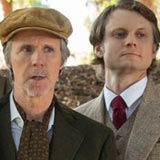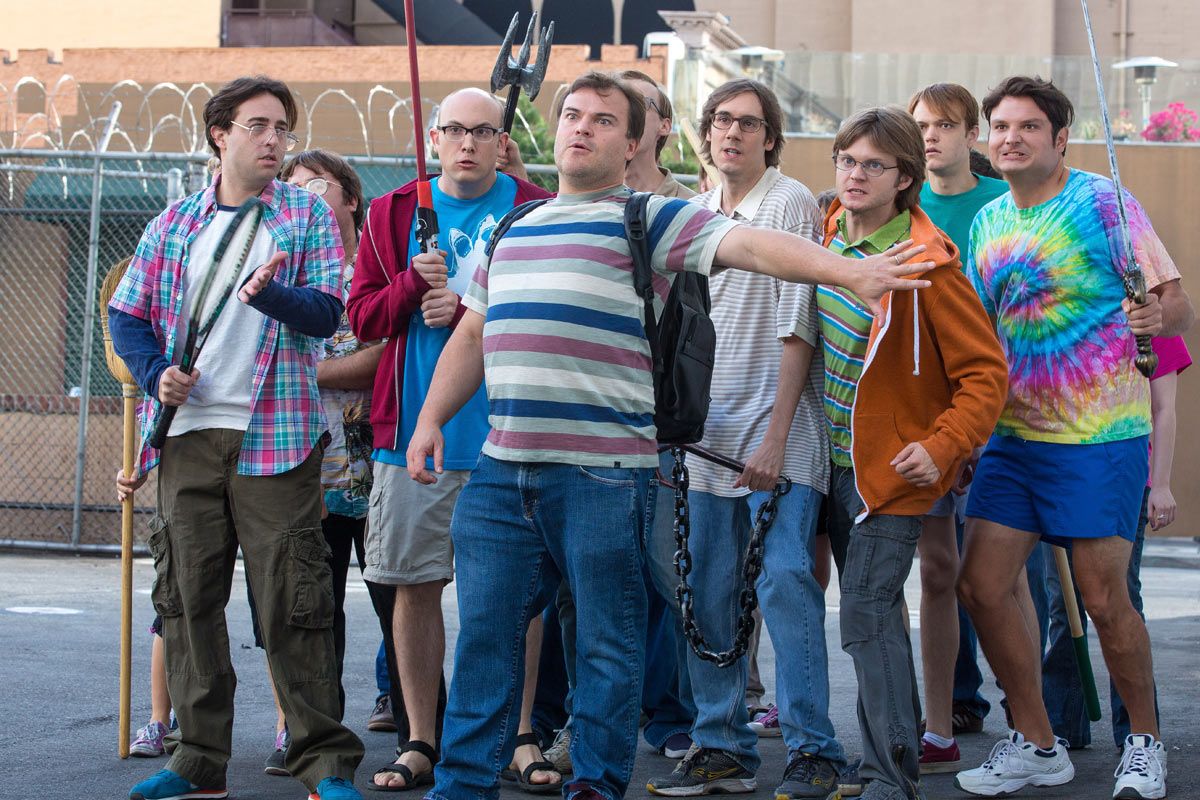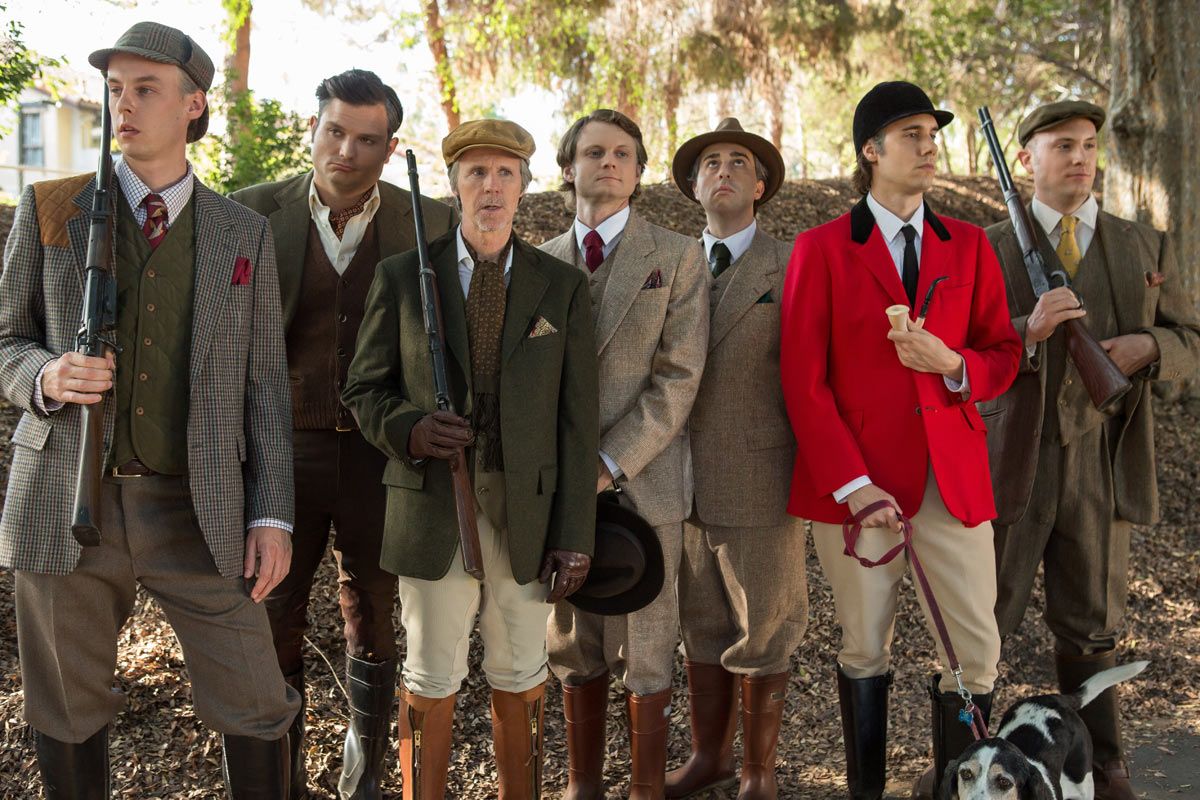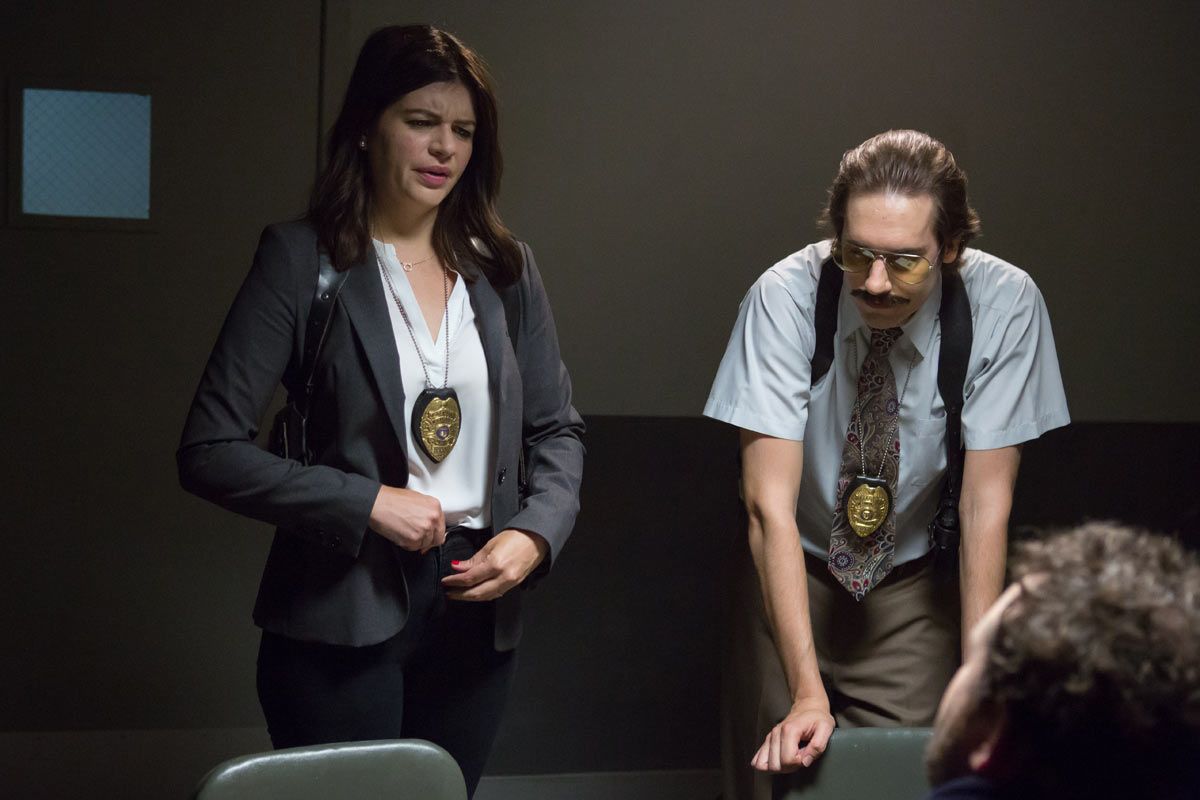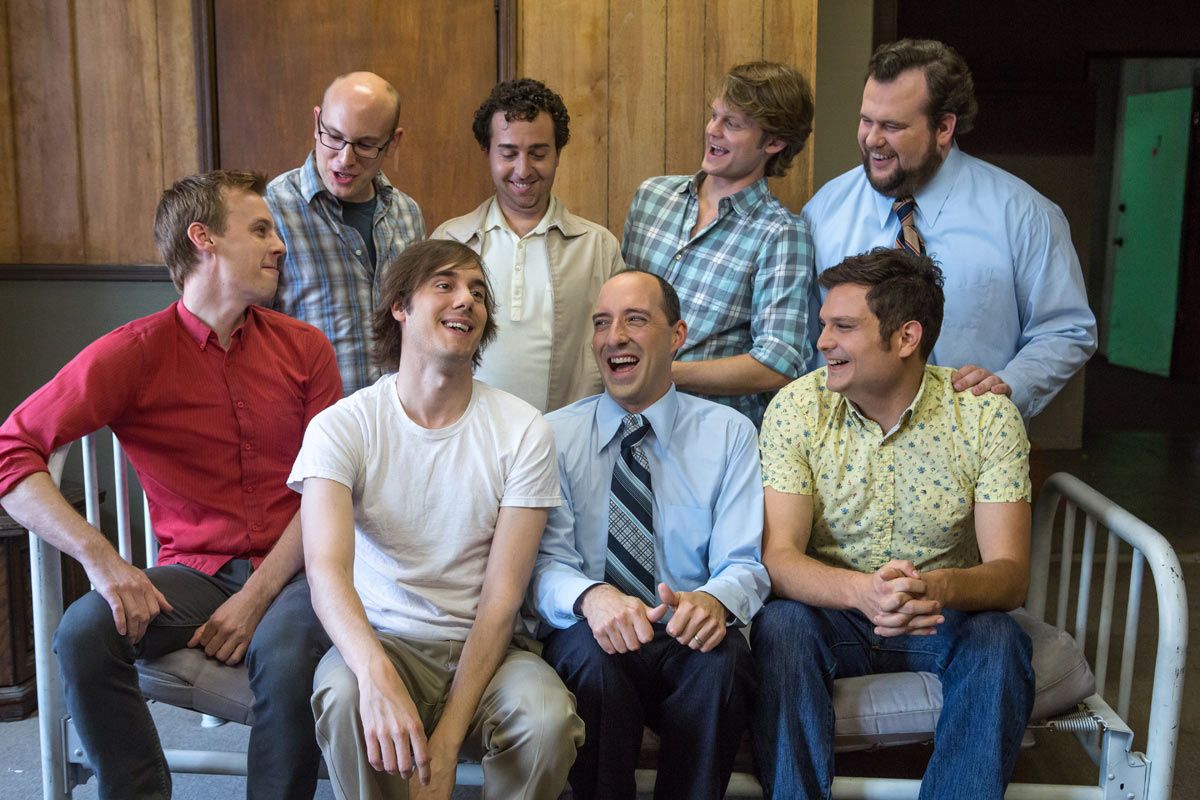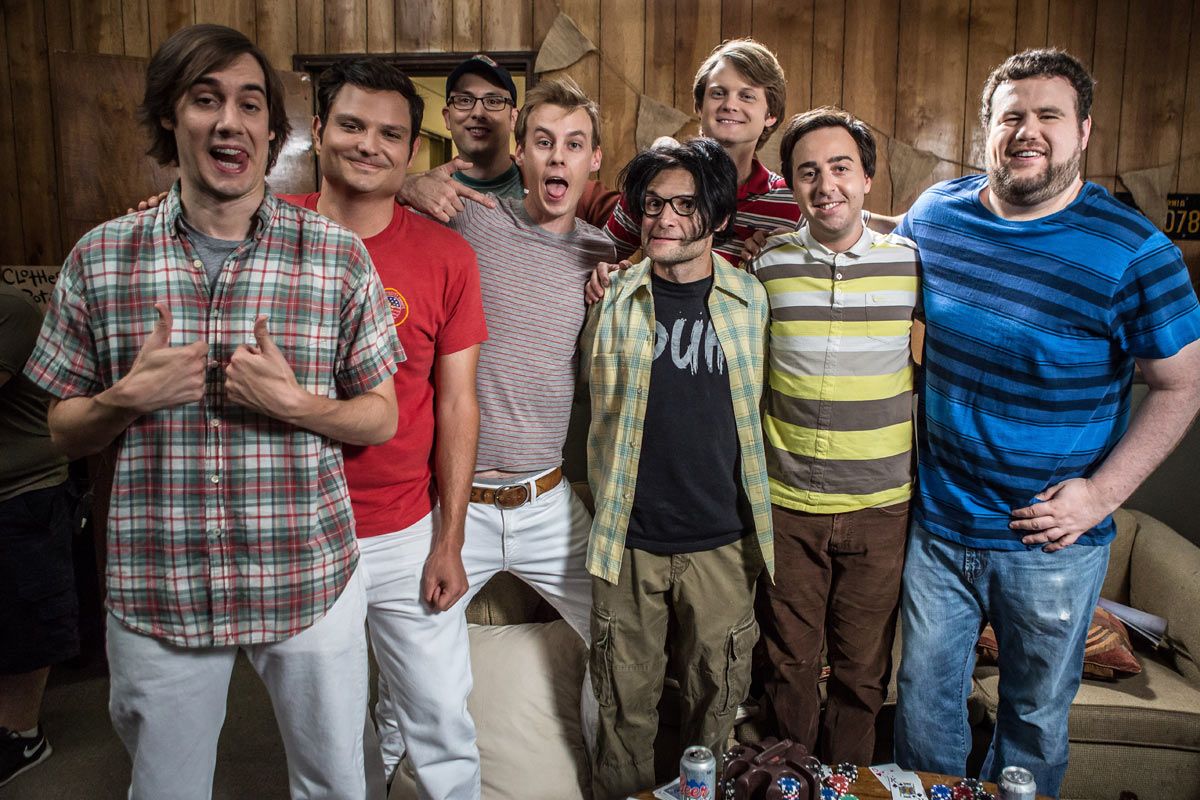You may not know The Birthday Boys, but you'll definitely recognize quite a few of the faces on The Birthday Boys, the sketch comedy group's TV show that returns for a second season tonight at 11:30 on IFC.
The Birthday Boys -- Jefferson Dutton, Dave Ferguson, Mike Hanford, Tim Kalpakis, Matt Kowalick, Mike Mitchell and Chris VanArtsdalen -- started as a stage show at the Upright Citizens Brigade Theatre in Los Angeles, and caught plenty of high-profile attention over the years; notably Bob Odernkirk and Ben Stiller (who have a shared history on sketch comedy with Fox's short-lived but fondly remembered 1992 series The Ben Stiller Show). Odenkirk and Stiller serve as executive producers on The Birthday Boys TV show, with Odenkirk appearing frequently in the show's first season.
This year, though Odenkirk retains a presence on The Birthday Boys, his schedule (including filming Breaking Bad spinoff Better Call Saul) limited his on-screen availability -- adding room for plenty of guest stars, ranging from major comedy names like Dana Carvey, Casey Wilson and Chris Elliott to the considerably less expected, like Marvel's Agents of S.H.I.E.L.D. star Chloe Bennet, Corey Feldman and Fabio. (Yes, that Fabio.)
SPINOFF spoke with three of the Boys -- Dutton, Ferguson and VanArtsdalen -- about what the guest stars bring to Season Two, adding some social commentary to the show's inherent absurdity and what the current boom in popularity of sketch comedy means to them, both good and bad.
Spinoff Online: Before we get started, I just wanted to say that your sketch last year about someone writing a letter home about Hope Floats really stuck with me, especially that last line, "P.S., I'm kind of a weird guy now."
Dave Ferguson: You'd be surprised how many times we've ended a sketch with "I've turned into kind of a weird guy." It's the ultimate justification for any scene.
Last weekend, you were all at New York Comic Con, both doing a panel on Saturday night and then a live show the next afternoon. How was that experience for you?
Ferguson: It was fantastic. We went last year as well, and we were paired up with Scott [Aukerman, host of Comedy Bang Bang, which returns for the second half of its third season at 11 tonight on IFC] both times. The room draw is really fun, because there's nice crossover with us and Bang Bang -- some of us write on Bang Bang, and also I think there's just a sensibility matchup somewhere in there. It was a really fun house. We sneaked a peek of some sketches from our show, and Scott screened a Wayne Coyne interview on his show. The room response was really great, and as always, the panel went off the rail and we ended up saying some things that we all regret. [Laughs]
Chris VanArtsdalen: It was really great to get a couple questions from people who had actually seen the show in Season One. We didn't think any of them were out there, but a few people actually had seen some sketches.
Jefferson Dutton: I was kind of bummed we didn't get to see the showroom floor or anything like that. We flew in right before the panel, so we were dropped off at the artists' entrance. We saw Mike Tyson real quick, and we got on his golf cart, and they sped up in three golf carts through the bowels of the Javits Center, directly to the stage -- and as soon as it was done, we were back on the carts, then out on the street. It's like how Obama must feel when he travels.
Ferguson: Exactly how Obama must feel. And much like Obama, Jeff left with a bunch of unsigned graphic novels and comic books in his hands.
There's definitely an overlap between the alt comedy scene and the world of comic books -- I know Scott Aukerman, who you just mentioned, is a comics fan. What about you guys?
Dutton: Yeah. Chris and I are here because we're the comic book dudes of the group, I'd say. But I think the overlap is blamed squarely on Patton Oswalt and Brian Posehn, and everything else sort of stemmed from that.
VanArtsdalen: I'm nervous calling myself a comic book guy, because I'd feel like the next question will be some trivia that I won't know. But I have read a bunch, and I enjoyed them.
Then I'll skip the next question about mid-'80s DC Comics crossovers. Instead let's talk Season Two of The Birthday Boys. Going into the second season, how do you see this one as being maybe a little different than the first? Presumably, just by virtue of that experience of having one whole TV season under your belt, the approach must have changed at least a little bit.
Ferguson: Yeah, absolutely. One of the things that Bob talked a lot about in between seasons, and that we talked about a lot with the network, is deepening the show, in a couple of ways. One was to give it a little social relevance -- a little more commentary. As sketch comedians, a lot of times we just want to go with the biggest, funniest idea, because we love that. But that kind of becomes a given at some point, and you try to also make sure that the show has some cultural value. We tried to deepen what we were taking on in our own way. We didn't take the usual targets of disposable day-to-day topics, but just to kind of comment on the world.
The other was to continue to make the episodes feel more cohesive. In Season One, we kind of took all of our greatest hits ideas and sketches and put them on a board, and we were able to move them around at will. This year, we tried to make episodes that kind of reward the viewer by paying off -- maybe it's a story arc, maybe it's a theme, but basically the episodes are made of sketches that all have a reason to be together, and build to something.
The most noticeable, superficial change is in lieu of having Bob in every sketch, because of his Better Call Saul schedule -- we have Bob on the show still, and he has an episode that's 100 percent his own -- but we brought in a ton of great guest stars, like Chris Elliott, Horatio Sanz, Ellie Kemper, Jack Black. Dana Carvey's in the premiere. It was a chance to work with other legends in comedy, which just continues to deepen your performance chops, because all those people elevate your focus and your game, and remind you that you could be funnier. [Laughs]
The guest stars are definitely something that's very apparent just from the first couple of episodes this season -- there's Dana Carvey, Paul Scheer -- Fabio makes a big impact. How do those generally come together? I imagine quite a bit of them are friends or friends of friends, but some of them -- correct me if I'm wrong -- like Fabio, you're meeting for the first time.
Ferguson: Fabio is Chris's uncle, but other than that...
Bob and Ben Stiller, our other executive producer, are good vouch points. Jack Black had seen the show, and really liked a couple sketches. That was kind of a no-brainer. We generally don't write to a celebrity, we would get burned by that because our schedule is so limited, so we try to write just really great roles that especially a comedian is going to dig into. Then if there's some kind of specialty casting, we try to at least pick people that seem like fun gets, and people that would be interesting to have on set. It was pretty great -- Jeff and Chris can comment, since they were directing these people, but it's amazing from a process standpoint, because they were so down.
Dutton: It's really shocking to have a Dana Carvey or a Jack Black on set, and they weren't star-y at all. You kind of have to be cool to do our show, because we're a small show, we don't have all the money in the world, and these guys really showed up with a great attitude, and were really collaborating in a way that is a little bit mind-blowing for us. Those guys are formative for our teenage years. So having them on set, and they were caring about our show and going back and forth about how to do some things, was a real treat.
VanArtsdalen: Dana Carvey in particular -- you wonder how he's going to be when he shows up, if he's going to be like his persona on TV. He was such a dream. He would just hold court with the whole cast and crew and tell stories to everyone. He just had everyone rolling in the aisles with laughter, on and off camera. Such a funny dude.
Ferguson: In addition to the celebrity guests, there were people who kind of crossed the line of friend/rising star. So we have these great comedians from the UCB Theatre, like Stephanie Allynne or Alana Johnston. Even Casey Wilson is somebody who's just a pal from the theater that also happens to be having an amazing career, and was nice enough to give her time.
VanArtsdalen: Kind of the same thing with Lennon Parham, she's a sketch comedian we've known and worked with for a bunch of years. We did a Sketchfest festival with her years ago, and now she's got her own show and she's a big star. It's cool to be able to work with those people again.
Are any guest stars that pop up as unexpected as Fabio?
Ferguson: He stands out as the one that kind of takes you aback. The other one that is not of the world of comedy would probably be Carmen Electra.
The Jack Black episode, which is probably a particularly good episode for your following, deals with reboots -- like Smurfs, Muppets, the idea that a kids' franchise that you know and love gets rebooted -- and is that a good thing, should there be any pressure on it, is it for kids? Jack Black plays kind of himself almost, as a human character in an animated film, and he doesn't really care about the franchise, but we got this great cameo from his buddy Kyle Gass in the same world -- it's a really fun use of the two of them as a point/counterpoint.
VanArtsdalen: One guest star who I don't know if she's done a lot of comedy was Chloe Bennet. She was really great -- just super-funny, super-charming. I think we're going to be hearing quite a lot from this little lady. [Laughs]
Ferguson: She was so awesome. Jeff both directed and acted in the scene, and it required a little romance, so that was right out the gate an exciting day. But she absolutely handles comedy very well. I feel like that's a whole other side of her chops.
You did a monthly stage show at the UCB Theatre as The Birthday Boys for years. Moving into doing a TV show, how much has that opportunity changed your approach to what you're writing, and what kind of sketches you can do? It feels like the same type of sensibility you've always had, but how do you see things evolving with the new things that you can do?
Dutton: Even in our monthly show, we did about a video or two a month -- we tried to do a multimedia approach to our live show. We sort of knew how to do our own little DIY things. You'd be surprised how much of that is working in the show to this day. It was a nice little leap, and there actually weren't too many stage sketches in the first season -- we might have pilfered comedic premises, but I'd say that maybe only like 10 percent of the stuff was straight adapted from the stage to the screen. And it's still about that now. We relish the opportunity to use TV and cutting and a cinematic approach to the sketches. We like genre-hopping a little bit, and seeing what we can pull off with no money. It's been a real challenge, but a fun one, from stage to screen.
VanArtsdalen: We also had certain stage sketches that we loved on stage, but we decided wouldn't play very well on TV. We had an old one called "Pecking Order," where we were all in the army, and our sergeant is a duck. On stage, we had a real, live duck come out, which was hilarious, just to see a duck waddle around a stage.
Dutton: With an army helmet!
VanArtsdalen: But then we decided that's not as funny on TV, because you see ducks on TV all the time.
It's surely been pointed out to you that right now there's something of a sketch comedy renaissance on TV. Things were pretty dry for a while after Chappelle's Show ended, but now there's Key & Peele, Inside Amy Schumer, Kroll Show, Portlandia and of course your show. The Comedy Bang Bang TV show is basically sketch comedy. Is it satisfying to be part of that wave? And how happy are you personally to see that format embraced again by a mainstream audience?
Ferguson: It's a combination of feelings. [Laughs] One is, "Shoot, why didn't this happen three years ago?" Because I can assure you we were pitching our little sketch comedy show before that boom was evident. It's funny -- if you talk to Bob, he just did a Salon interview where his quote was, "The sketch boom is about to burst" or something like that. I was like, "Hey, wait, what does that mean for us?" [Laughs] I think all he means by that is everything is cyclical. For this little rise, there will be another balancing fall.
But the coolest thing about being a part of it is you can take the idea of what a "sketch" is for granted. Everybody knows what "SNL" is, everybody knows the basic idea of a sketch, and that means that a show like ours can do something different. We can integrate story, or we can field shoot more, or we can call something back five times in an episode, and do more of a long-form study of a really stupid idea. That was I think what Bob means by that -- I've heard Tim and Eric say a similar thing of, "Being funny is dead." [Laughs] That's a given. So what are you doing with it? I think that a big calling card of our show this year was to do things that other shows can't do, because everybody knows that a good sketch is a good sketch. You're going to do a few of those and we love those, and we'll continue to do them, but we want to push the envelope in weird ways, not just in content.
Your readers can probably really empathize with this feeling: As good of a thing as it is that this renaissance or boom has happened, put yourself in the shoes of a comic book writer, or a comic book fan, who all of a sudden wakes up to see that some jock that went to his high school is directing a comic book adaptation film. That boom has now spread into a form where it's like, "Wait a second, I was doing this thing, and now it's a thing that everybody likes? What the hell!" I think the really curious thing about that situation is, as close as we've been to that scene -- it's not sour grapes, it's just that feeling of,"I hope people still realize that we aren't jumping on some bandwagon. We've been a group for 10 years. We're all about our sensibility and our take on sketch comedy, versus the perusal of some kind of fad.
VanArtsdalen: The whole reason I got into sketch comedy was to try to get reality TV shows off the air, so just the fact we have more sketch comedy on TV means less reality shows, and I'm happy.
Dutton: I think there's a direct relation to the popularity, or the new normal of streaming. Chappelle was in a pre-streaming world, and in that sort of environment you can indulge a lot of different points of view. And Kroll and Key & Peele and Portlandia and us, they all definitely have their flavor to them. They're not the old-school sketch model of, "Let's hire a bunch of funny people, and hire a bunch of writers, and see what happens." They all have a pre-existing relationship feel. I would say none more so than our group, who have been friends for 10 years. [Laughs]
Any last things you'd like folks to know about The Birthday Boys Season Two?
Ferguson: Jeff, do you want to mention your favorite comic?
Dutton: Well, it's a manga -- Akira. I think Akira's probably one of the best things.
VanArtsdalen: My favorite graphic novel is Black Hole. That's a great one.
Ferguson: And my favorite novel is The Things They Carried. Throw that in there. [Laughs]

